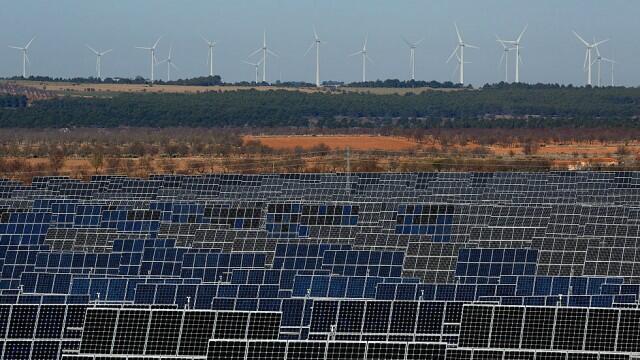President Trump’s decision to withdraw from the Paris climate change agreement could exacerbate a decline in the development of clean energy technology in the United States.
Venture capital investment in clean energy projects has declined in recent years, with the number of deals in “cleantech” falling from 412 in 2011 to 267 in 2016, according to the National Venture Capital Association. In that same timespan, venture capital investments in cleantech fell from around $5 billion to roughly $2.5 billion annually.
Experts say that trend could accelerate now that the United States is pulling out of the Paris accord.
“Trump’s withdrawal from Paris could well depress cleantech growth by injecting new uncertainty into the equation, and by beginning to marginalize the U.S. in global diplomatic discussions about the huge global clean energy marketplace,” says Mark Muro, a senior fellow at the left-leaning Brookings Institution.
Muro and others think that Trump makes risky cleantech investments even riskier.
“The main reason for public investment in science and technology is that the risks are too high for private investors,” said David Hart a senior fellow at the Information Technology and Innovation Foundation, a technology think-tank.
Such investments are less stable than lower overhead software companies popular with venture capital investors. Investors accordingly look to the federal government to ease uncertainty in these investments. In a Brookings report from May, Muro argues that a lack of federal involvement, to help mitigate the risks of investment could depress cleantech investment even more.
Other observers agree that withdrawing from the climate agreement will not help inspire confidence in cleantech investing necessary for growth in the sector.
Alex Molinari, CEO of Johnson Controls, a Milwaukee-based international conglomerate said on CNBC last week that the withdrawal was the U.S. seceding “the leadership position that it has around technologies, around these technologies.”
“He is sending a signal that the U.S. is not committed to a cleantech future,” said Rep. Ro Khanna (D-Calif.) whose district includes Silicon Valley.
“I think that the decision to withdraw from the accord is very problematic for our competitiveness,” Khanna continued arguing that depressed clean technology investment that could stem from the withdrawal would also slow down the U.S.’s “ability to be the world leader in cleantech jobs.”
The U.S. has already been sliding from the top spot. Ernst and Young, who had consistently ranked the U.S. as the leading market for renewable energy investment downgraded the country to third place this year, behind China and India.
Trump’s withdrawal from the Paris climate agreement isn’t the president’s only policy giving lawmakers and renewable energy technology experts cause for concern over innovation in the field. His critics point to his budget proposal which would gut federal spending in the clean technology space.
“Trump and Congress could do much worse near-time damage by slashing cleantech R&D, cutting money for scale-up, and reducing important clean energy tax incentives as for solar and wind installation,” Muro said.
Trump’s proposed budget would cut funding for the Department of Energy staff currently running the U.S. Mission Innovation operations. It also calls for cuts to the Advanced Research Projects Agency-Energy and the U.S. Department of Energy loan guarantee program. Both provide federal back for technology too risky for traditional financial routes — an area much of cleantech falls squarely into.
“There’s a food chain for innovation,” ITIF’s Hart said. “The federal government needs to play along the whole chain. The fed proposed budget is going to pull us back on the whole chain especially on public private research.”
Hart and other experts fear those kinds of cuts on public invest could inhibit cleantech private investment, holding growth back across the whole space.
Despite the president’s recent actions though, some are still optimistic in the future of clean technology investment.
“Whatever the level of federal investment in [renewable energy] is, it is the future and it is the present,” Rep. Jared Polis (D-Colo.) told The Hill. Polis has been active on clean energy in Congress.
“We’re worried about the cuts to science,” Polis continued. “I think the trend is larger than whatever is happening in Washington though.”
Even though Trump’s policy threatens venture capital and federal investment in clean energy technology, some groups are taking steps to increase their own investment in the space, giving credence to Polis’s optimism.
Major technology companies are expanding green energy options and picking up some of the slack from the hole that the government is leaving in funding.
Apple, Google and Tesla have all ramped up their green energy efforts, purchasing solar farms to power various facilities they own around the country. Apple and Google have also purchased wind farms to power their facilities as well.
“I’m confident that Californians and Silicon Valley will continue to lead [cleantech innovation] because they understand what’s at stake,” Khanna said. “Now the president is making it more difficult. That doesn’t mean we’re going to stop the fight.”
Source: http://bit.ly/2s72Ppy











